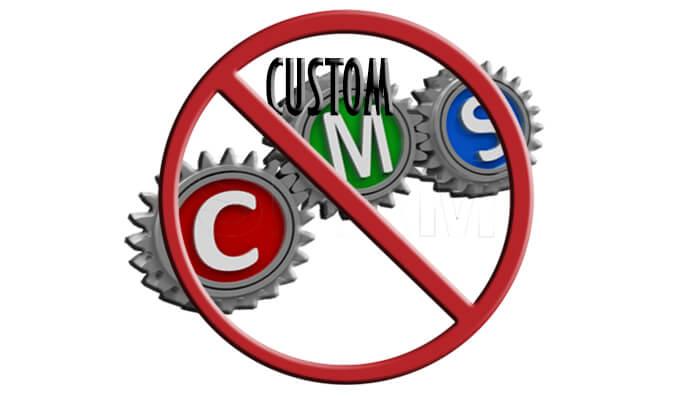Three Reasons Why You Need to Avoid Custom CMS Platforms
As you surely know by now, a website is an absolute necessity if your business is going to be a competitive player in today’s digitally-oriented marketplace. This means that choosing the right content management system (CMS) from the start is critically important to both the functionality of your website and your overall business success.
A CMS is basically the framework that a website is built upon. It’s a software application that creates, stores and manages information files, and can be set up on a network, hosted on the Internet, or run on your own computer.
The Three Types of CMS Platforms
With some variation, CMS platforms usually fall into one of three basic categories.
- An open source CMS is a freely available platform that can be downloaded and customized by anyone without the necessity of buying a license. Many thousands of free templates and plug-ins are available to create a truly customized website. Most search engines favor open source solutions because the straightforward coding allows the search robots easy access for indexing web pages.
- Proprietary CMS platforms are owned and licensed for use by their developer. Customization usually requires the additional purchase of a “developer license,” and will typically require the services of a trained and expensive coding expert to make the desired alterations.
- A custom CMS solution is just that – customized to the requirements of the individual end user. Purchasers of a custom CMS platform can have just about any design and functionality features that can be imagined built into their platform – as long as they have pockets deep enough to pay for it.
A Custom CMS is Probably the Worst Option for Your Business
While building a website on a platform completely customized to your individual requirements might sound like a great idea, a custom CMS is almost certainly a bad choice for your business. Unless you have a dedicated team of website development, design, and coding experts as well as virtually unlimited funds, a custom CMS-based website is simply going to leave you frustrated and broke.
Consider the history of WordPress. Getting this open source CMS platform off the ground required five lead developers, eight senior consulting developers, nine contributing developers, three designers, two documentation and support specialists, and a virtual army of testers. In its first eight years, WordPress was updated a total of 59 times. Is your company prepared to make anything even close to that type of commitment to launch a custom CMS?
Problem #1: A Custom CMS Locks You in with Your Developer for Life
Once your custom CMS-based site launches, the headaches and expenses really begin. Your web development company is the only one who really knows your system inside and out, which means you’re going to pay handsomely for every single update and system tweak from now until the end of time. What about finding another computer geek to fix your website? That can definitely be done, but finding a competent expert who is willing to reverse-engineer someone else’s creation is going to cost you big-time.
Problem #2: A Custom CMS is Going to be Buggy
Software and bugs go together like peas and carrots. No matter who codes your site, you’re going to have bugs that need to be fixed. While your contract will most likely specify a certain amount of support that the developer is required to provide, the real issue is how well your business is going to survive while your website is periodically “closed for repairs.”
Problem #3: A Custom CMS Requires Custom Training
Everyone in your company who accesses your website in the course of their work is going to have to be trained on your new CMS. The real problem is the lack of readily available training and help resources. Someone is going to have to create that documentation from scratch, and that’s not going to be cheap.










